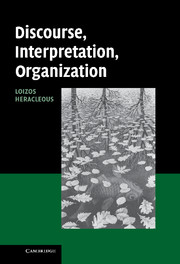Book contents
- Frontmatter
- Contents
- List of figures
- List of tables
- Preface
- 1 Images of discourse: interpretive, functional, critical, and structurational
- 2 Interpretive approaches to organizational discourse
- 3 Functional approaches: metaphor in organization change and development
- 4 Critical approaches: Michel Foucault's conceptions of discourse
- 5 A structurational approach to discourse
- 6 Analyzing discourse I: discourse as situated symbolic action
- 7 Analyzing discourse II: a tale of three discourses
- Index
- References
6 - Analyzing discourse I: discourse as situated symbolic action
Published online by Cambridge University Press: 22 September 2009
- Frontmatter
- Contents
- List of figures
- List of tables
- Preface
- 1 Images of discourse: interpretive, functional, critical, and structurational
- 2 Interpretive approaches to organizational discourse
- 3 Functional approaches: metaphor in organization change and development
- 4 Critical approaches: Michel Foucault's conceptions of discourse
- 5 A structurational approach to discourse
- 6 Analyzing discourse I: discourse as situated symbolic action
- 7 Analyzing discourse II: a tale of three discourses
- Index
- References
Summary
This chapter presents a conceptualization of organizational discourse as situated symbolic action, drawing from the fields of speech act theory, rhetoric, ethnography of communication, and social constructionism. It is suggested that speech act theory presents a theory of discourse as action, but essentially remains at the microlevel of interaction, without sufficient attention to context and intertextual analysis. Rhetoric is introduced as an approach that can address both text and context, viewing discourse as a situated social practice. Further support for discourse as a situated practice comes from ethnographies of communication. Finally, social constructionism is discussed as a perspective that emphasizes the symbolic nature of discourse, both at the level of discursive action and bodies of discourse and their “metacommunicative” effects of framing issues in particular ways.
The conceptualization of organizational discourse as situated symbolic action is illustrated through analysis of an episode of negotiated order, a meeting of senior managers of Systech, a major information technology (IT) organization where a new business model for its advanced consulting division was being debated. The business model favored by the recently hired Group President entailed a move from the more traditional, functionally based, distributed model of client engagement employed at the division to a “principal-centered” consulting model involving principals who “owned” clients and were responsible for all aspects of the client engagement. This move would entail substantial reallocation of power, status, and influence within the division and was hotly contested.
Information
- Type
- Chapter
- Information
- Discourse, Interpretation, Organization , pp. 133 - 164Publisher: Cambridge University PressPrint publication year: 2006
